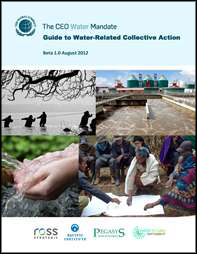Guide to Water-Related Collective Action and Water Action Hub

Guide to Water-Related Collective Action and Water Action Hub
Global water challenges must be addressed through collective action, where multiple stakeholders collaborate on shared water stewardship goals. The Water Action Hub, from the United Nations Global Compact’s CEO Water Mandate, is the world’s first online platform to unite companies, governments, NGOs, and citizens on a range of critical water projects in river basins around the planet. This guide provides step-by-step instructions for stakeholders to productively engage in collective actions, and includes success stories. The Pacific Institute is co-secretariat of the CEO Water Mandate, which mobilizes business leaders to advance water stewardship, sanitation, and the Sustainable Development Goals. The Water Action Hub is designed to help companies and other organizations identify potential partnerships in specific river basins through a map-based data management system. Users can find projects by selecting a geographic area of interest, a particular organization, or a specific project. This guide focuses on water-related collective action. Written primarily for companies new to external engagement on water issues, it supports internal analysis and decision-making, helping companies become well-prepared for external-party discussions and collective action activities. Other parties—governments, NGOs, and others—may also find the strategies and insights to be useful.
Key findings include: The guide is structured around five elements of collective action preparation: Effective collective action is key to successfully addressing shared water challenges and the vulnerabilities they present to many companies. In its most productive form, collective action leads to a strong sense of shared interests, shared responsibility, and shared benefits. Companies will typically embrace collective efforts with other interested parties to: Collective action can take a variety of forms, ranging from a relatively informal exchange of perspectives to highly structured joint decision-making, implementation, and accountability. A successful collective action will typically build from a shared sense of risk, responsibility, and benefit among interested parties, and the process will emphasize dialogue that leads to stronger outcomes than those achieved through unilateral action.
Online Tool: Water Action HubOverview
Key Findings
Resources

